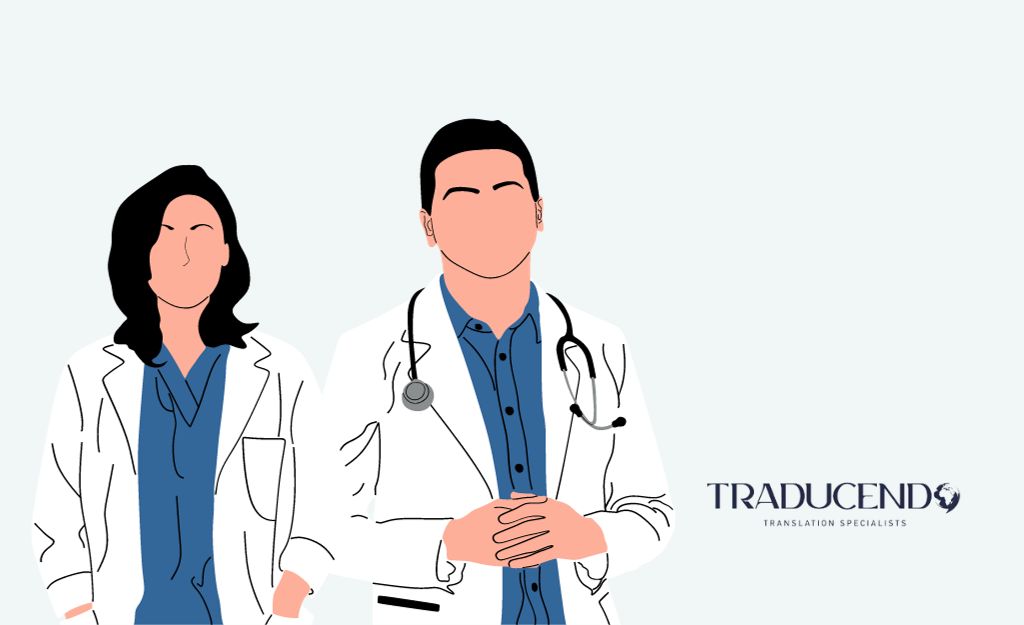This website uses cookies so that we can provide you with the best user experience possible. Cookie information is stored in your browser and performs functions such as recognising you when you return to our website and helping our team to understand which sections of the website you find most interesting and useful.
Medical translation: why translations are required for compliance with medical industry regulations

Medical translation is a specialised discipline that plays a vital role in the healthcare industry. Globalisation has increased linguistic diversity in the medical field, making translations key to guaranteeing effective communication and compliance with industry regulations.
In this article, we’re going to explore the importance of medical translations and how they help companies to comply with regulations in the healthcare industry.
Linguistic diversity in the medical industry
The medical industry is extremely diverse and globalised. Medical advances and research are shared around the world, which means that scientific discoveries, medical protocols and information about pharmaceutical products must be made available in multiple languages so that they can be accessed by a global audience.
In addition, accuracy and clarity are crucial in the medical world, as any misunderstanding could put people’s health at risk.
The importance of accurate communication
In the medical industry, accurate communication is vital to ensure patient safety and regulatory compliance. Doctors, researchers and health professionals need to be able to communicate effectively with patients that speak different languages.
In addition, medical documentation, such as patient reports, clinical histories and medication labels must be made available in the relevant languages.
Regulations and requirements in the medical industry
The medical industry is subject to strict regulation and requirements that govern all aspects of its operation: from the approval of medicines to the provision of medical care.
Regulations are vital to ensuring the safety and efficacy of medical treatments and procedures. Medical translations play a fundamental role in achieving compliance with these regulations.
Approval of medicines
Before a medicine can be approved for use in a given country, it must undergo a rigorous review and approval process governed by the local regulatory authorities.
This review involves the evaluation of clinical trials, medicine labels, leaflets and other documents associated with the product. If approval is sought in a country where a different language is spoken, all these documents must be made available in the local language.
Labelling and packaging
The labelling and packaging of pharmaceutical products and medical devices is essential to guarantee patient safety.
Accurate translations of labels and leaflets are key to ensuring that users understand how to use the products safely and effectively. Any translation error could give rise to misunderstandings and health risks.
Clinical reports and research documentation
Medical research is performed all over the world and the results of clinical trials and research documentation must be made available in a range of languages so that they can be accessed by the global scientific community.
This is fundamental to achieving medical advances and enabling collaboration between researchers from different countries.
Challenges in medical translation
Medical translation presents some unique challenges that require a high degree of specialisation and in-depth knowledge. Below, we’ve detailed some of the most common challenges in medical translation:
1. Specialised terminology
Medicine uses highly specialised terminology that can vary from one country to another. Medical translators must be familiar with this terminology and ensure that the correct terms are used in the translation.
2. Regulatory changes
Medical regulations may change over time and can differ from one country to the next. Medical translators have to keep abreast of these changes and make sure that the translations comply with the current regulations in the target country.
3. Culture and cultural sensitivity
Cultural sensitivity is crucial in medical translation as medical practices and attitudes to health may be different in other cultures. Translators must take into account these cultural differences when translating medical documents.
Certification in medical translation
Given the importance of accuracy and regulatory compliance in medical translation, many countries have certification systems for medical translators. These certifications ensure that translators have the skills and knowledge required to produce high quality, accurate medical translations.
Here at Traducendo Ltd, we have extensive experience in healthcare. We rigorously select translators with more than five years’ experience and specialist qualifications, so we can guarantee medical translations that are of the highest linguistic and scientific quality.
Our terminological resources are regularly verified by experts in a range of fields and we use cutting-edge software to ensure consistency and quality in our translations.
We also offer translation services for medical records, scientific reports, pharmaceutical documents and medical software. We specialise in translations for chemical, biological and genetic analysis laboratories.
We are a trusted partner for companies who value accuracy in the healthcare and medical fields. If that sounds like you, get in touch today.

